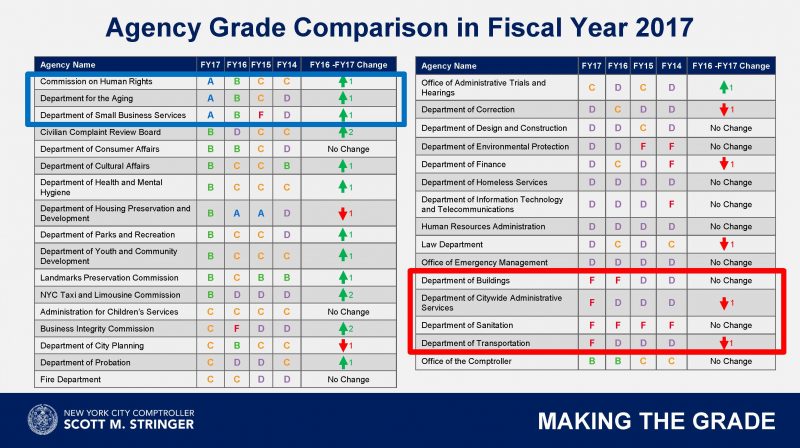Comptroller Stringer Releases 4th Annual Making the Grade Report
Since letter grades started in 2014, progress emerging
More Agencies Receiving “A” and “B” grades than ever before, though some agencies holding the City back
Annual spending with M/WBEs to $554 million in FY 2017, an increase of $208 million since FY 2014
(New York, NY) — Comptroller Scott M. Stringer today released his fourth annual “Making the Grade” Report, which evaluates each City agency’s contracting with minority- and women-owned businesses – or M/WBEs. Using an identical formula as previous iterations of the report, the 2017 “Making the Grade” gives the City an overall “D+” grade for the third straight year.
In FY 2017, the City awarded $21 billion total in goods and services to outside vendors. Of all citywide contracts, just over $1 billion was awarded to M/WBEs. That represents 4.9 percent of all citywide awards – an uptick from 4.8 percent a year ago and a rise from 3.9 percent in FY 2014.
Enacted in 2013, Local Law 1 regulates the M/WBE program. When examining Local Law 1 spending specifically – which reflects a smaller subset of overall City procurement – the City awarded 11.4 percent of all its contracts with M/WBEs. Though it represents a decline from 13 percent two years ago, it reflects a significant rise from 6.8 percent in FY 2014.
Promising signs have emerged, however. In FY 2017:
- Actual spending with M/WBE firms is up to $554 million in FY 2017, a $208 million increase since FY 2014
- 22 percent of the 5,259 certified M/WBEs received City spending, compared to 18 percent in FY 2014. The number of M/WBE companies receiving City contracts – 1,113 in total – has reached an all-time high.
- In the last three years, the City has certified nearly 1,000 more M/WBEs, which helps those companies receive government services and contracts – a jump from 4,115 in FY 2015 to 5,259 in FY 2017.
- The Commission on Human Rights, the Department for the Aging, and the Department of Small Businesses Services – which received a “C”, “D”, and “D” in FY 2014 respectively – all received ‘A’ grades. That represents a concerted, laudable effort by those agencies to increase their spending with M/WBEs.
“Four years ago, we launched this groundbreaking report to elevate conversation about fairness in our economy. Today, progress is happening. For decades, the deck has been stacked against M/WBEs. But now, we’re seeing steps in the right direction,” Comptroller Stringer said. “This issue is about growing our neighborhoods by delivering real, community-level wealth creation. It’s critical to tackling our affordability crisis, and let there be no doubt that the City has a long way to go. The Mayor’s Office and Deputy Mayor Buery, in particular, must be recognized for taking important steps forward. It’s our hope and belief that the initiatives launched by the City recently will pay dividends in our reports down the road.”
“Making the Grade” awards agency grades based on the actual spending in each fiscal year, rather than the registered value of contracts, which may or may not result in actual spending and can often span multiple years. The report uses data from CheckbookNYC – the Comptroller’s transparency website – to analyze how much 31 Mayoral Agencies and the Comptroller’s Office spent with M/WBEs during the last fiscal year. While spending with M/WBEs has increased in recent years, the City’s grade remains a “D+” largely because agencies with the highest spending are also those with the worst M/WBE performance. Last year:
- Compared to FY 2016, grades increased at 13 agencies in FY 2017. Overall, 42 percent of agencies saw their grade increase in the last year.
- There are now more agencies receiving “A” and “B” grades than ever before.
- Grades decreased at seven agencies and remained the same at 11 agencies.
- Four agencies received “F” grades. The Department of Buildings, the Department of Citywide Administrative Services, the Department of Sanitation, and the Department of Transportation scored the lowest marks.
- The Comptroller’s Office received a “B” grade for the second straight year. In FY 2017, the Comptroller’s Office spent $3.3 million with M/WBEs, or 24.3 percent of total office procurement.

As part of this report, Comptroller Stringer issued a series of policy recommendations for the City to pursue in order to attain the Administration’s goals of certifying 9,000 M/WBEs by 2019 and awarding 30 percent of the dollar value of contracts to M/WBEs by 2021. Specifically, this report calls on the City to take the following additional steps:
- Assess large contracts with upcoming renewals and consider re-bidding to create new M/WBE opportunities;
- Establish a working group comprised of all certifying bodies and relevant stakeholders to streamline the certification process through a universal certification system. Even with recent improvements, the current M/WBE certification process is too cumbersome. As many as 10 separate entities certify M/WBEs and each have different processes that vary in their requirements.
- Like the Comptroller’s Office, the City should hire a full time Chief Diversity Officer (CDO) at every City agency to focus exclusively on M/WBE accountability. Each City agency should do so as well. Similar to the M/WBE Officer, the CDO would report directly to the agency head. However, M/WBE accountability would be the full time focus of the CDO, rather than just one part of their larger portfolio.
To read the full report, click here, and to view Power Point slides on the report, click here.
###